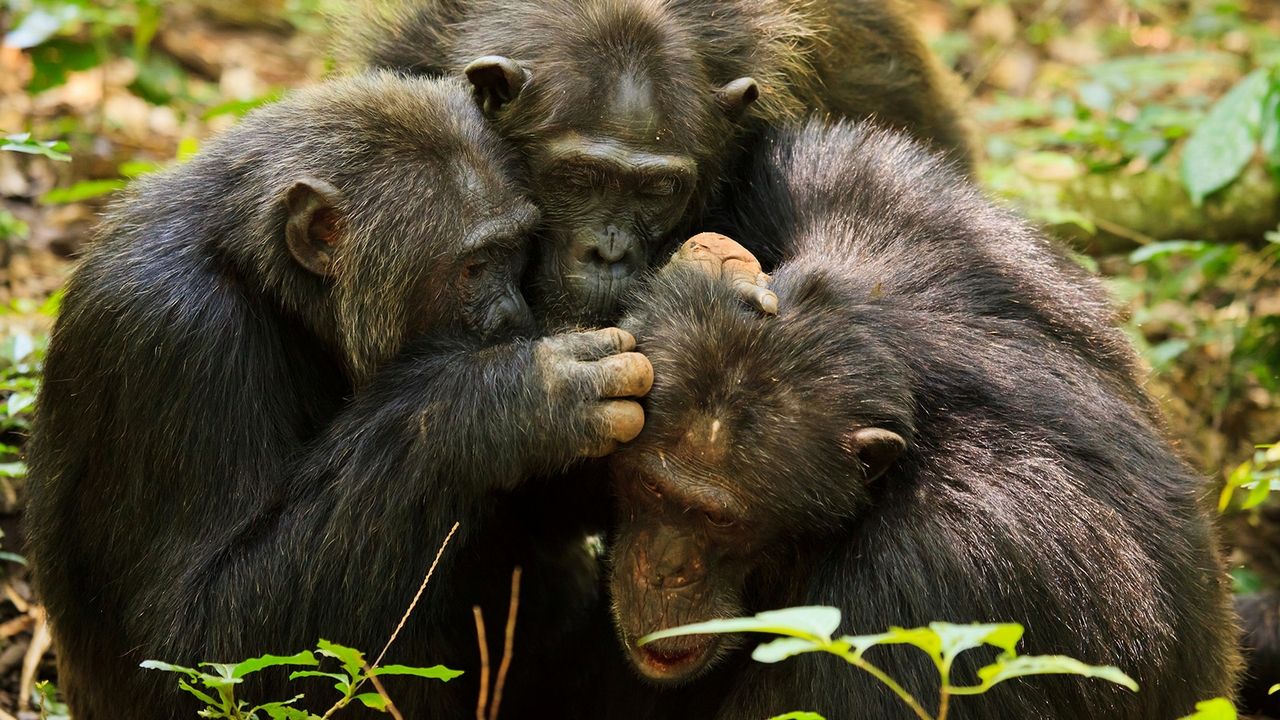Social Selectivity in Aging Wild Chimpanzees
Departmental News
Posted: Oct 22, 2020 - 04:00pm

Chimpanzee and human friendships show many parallels, according to new article, Social Selectivity in Aging Wild Chimpanzees, published this week in Science by Associate Professor Martin Muller, Associate Professor of Anthropology and co-director of the Comparative Human and Primate Physiology Center Melissa Emery Thompson, and their colleagues.
This work, a collaboration among researchers at UNM, University of Michigan, Tufts University, and Harvard University, uses data from the Kanyawara chimpanzee community living in Kibale National Park in Uganda and was funded by the National Institutes of Health and the National Science Foundation. These chimpanzees have been studied for decades by the Kibale Chimpanzee Project, and researchers leveraged this exceptional dataset to test socioemotional selectivity theory – an influential idea in psychology aimed at explaining why humans show changes in social interactions during aging.
“I study chimpanzee behavior and physiology, partly to help understand the evolution of human behavior and physiology… This study was part of a larger project on aging and health in chimpanzees. We were interested to see whether chimpanzees showed changes in their social relationships with aging that mirrored those commonly seen in humans,” said Muller, who has traveled to Kibale once or twice a year for 20 years to supervise the collection of these data, and, more recently, worked with graduate students at UNM to organize, clean, and analyze them.
Wild chimpanzees share social aging patterns with humans, by prioritizing strong social bonds, and interacting with others in increasingly positive ways as they get older.
Chimpanzee friends prefer each other's company. They tend to travel in the same groups and sit in proximity. Chimpanzee friends reciprocate. They groom each other, share meat with each other, and support each other in disagreements with other chimpanzees, Muller observed. And friendships can persist over many years. In laboratory studies, chimpanzees trust their friends more than other individuals in risky situations. Endocrine studies have shown that grooming with friends is particularly effective in reducing stress.
Using 20 years of behavioral data, researchers found that chimpanzees, like humans, increasingly prioritized mutual and equitable friendships with others that invested in them as they got older. Younger adults, in contrast, were more likely to form lopsided relationships where their partner did not reciprocate. Older chimpanzees also were more likely to be seen alone, but tended to socialize more with important partners when they did join the group. Finally, they showed a positivity bias in their overall behavior: reducing their aggressive behavior while maintaining levels of affiliative grooming.
Taken together, these results show that chimpanzees share these special social aging patterns with humans, even though they do not have the same rich future time perspective and knowledge of their own mortality that we have. This is the first demonstration that a nonhuman shares these characteristics with us. The shared pattern between chimpanzees and humans could represent an adaptive response where older adults focus on important social relationships that provide benefits, and avoid interactions that have negative consequences as they lose competitive fighting ability. This research highlights how long-term behavioral datasets from wild animals like chimpanzees can help us understand and promote healthy aging in humans.
Read the UNM News article here
Read the New York Times article here
Read the Guardian article here
Read the Science Commentary here
